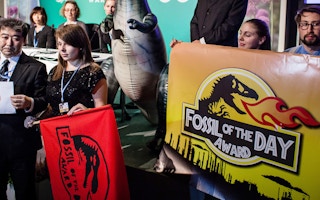Japan has shocked delegates at the UN Climate Conference here by abandoning its plans to cut greenhouse gas emissions by 25% by 2020 and says instead it will increase them by 3.1%.
The announcement, made in Tokyo in the middle of the night Warsaw time, used the shutdown of the nuclear industry in Japan following the Fukushima accident as a reason for abandoning the 25% target. But environment groups condemned this as a mere excuse.
Japan’s decision came at the end of the first week of negotiations in Warsaw, during which civil servants have been preparing for the arrival of government ministers by shaping the first drafts of agreements to provide new funding to developing countries to help them to adapt to climate change. They have also been working towards a global agreement to cut greenhouse gas emissions beyond 2020.
Some of the delegates here were alarmed by Japan’s announcement. China’s negotiator in Warsaw, Su Wei, said of the revised target: “I have no way of describing my dismay.”
Following the Fukushima accident in March 2011 50 nuclear reactors in Japan were closed amid safety concerns, accounting for 26% per cent of the country’s electricity generation.
As old fossil fuel plants were fired up to replace the nuclear stations, total carbon dioxide emissions began to grow and the Japanese Government announced it would review its 2020 targets.
Trampling corpses
The Government tried to dress up the announcement as a reduction in emissions by saying the new target for 2020 was 3.8% below the 2005 level. Campaigners pointed out that the old target was 25% below 1990 levels, so on that baseline the new target represented a 3.1% increase by 2020.
Following Canada’s repudiation of the Kyoto agreement two years ago and Australia’s decision earlier this week to abandon its renewable energy targets and other efforts to cut fossil fuel consumption, there was dismay in Warsaw at Japan’s news.
Wael Hmaidan, of Climate Action Network International (CAN), said:“It is unbelievable that this is happening. After the suffering in the Philippines the likes of Australia and Japan are trampling on the corpses of the dead.”
Kimiko Hirata, a Japanese representative of CAN, said “Japan is betraying these talks; this is very very disappointing, totally unhelpful, not to say destructive.”
Fossil of the day
She was particularly alarmed that the decision had been announced in the middle of the climate talks after more than two years of deliberations. “The government process has been totally without transparency. OK, 50 plants were shut down, but emissions only rose by 7.5% overall.
“This is just an excuse. Japan could still reduce emissions by 2020, I only hope that there will be such an internal and international reaction that the Government will reconsider.”
Japan was awarded the “fossil of the day” award by non-government organisations, reserved for the nation judged to have done most to obstruct progress at the climate talks.
It was clear that the Japanese representatives at the talks were not wholly comfortable at the decision either. Their chief negotiator, Hiroshi Minami, speaking at a press conference to explain the decision was challenged by a fellow-countryman to tell the young of his country what the decision meant.
He said: “That is up to the Japanese people to judge. This is very difficult personally, this is a serious matter and I have great sympathy, but as a bureaucrat I cannot answer the question.”
As well as announcing its changed target, Japan pledged that it would provide $16 billion by 2015 to help poor nations reduce their emissions and adapt to the effects of climate change, such as higher sea levels and more droughts.
Hiroshi Minami said the aid will be a mix of grants and loans, with $13 billion coming from the Government and the rest from the private sector.

















